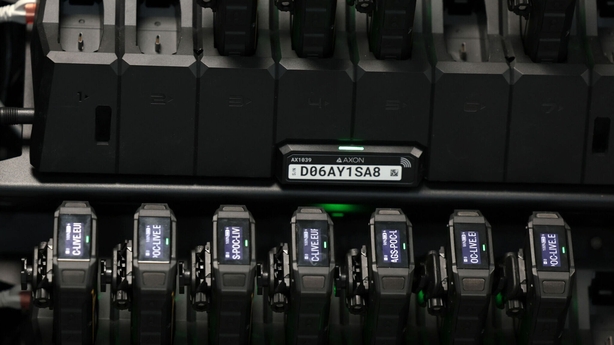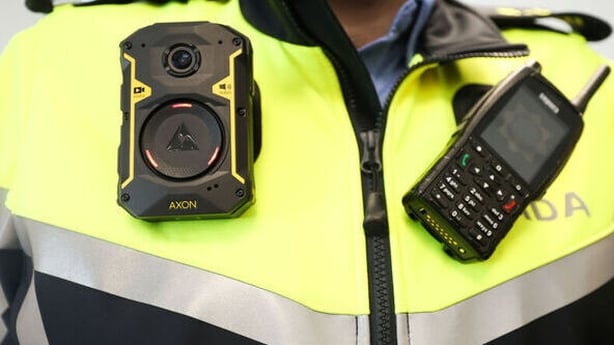Frontline gardaí in Dublin have begun wearing body cameras with around 350 gardaí from three garda stations using the technology on a pilot basis ahead of a planned roll-out across the country next year.
The cameras will be worn on a garda's chest and will flash red when they are turned on.
Gardaí will not have to tell members of the public when they are in use but will be encouraged to do so as best practice where possible.
The footage gathered would not be accessible until the cameras are put into a docking station, from where it would be transferred to a central storage facility.
They can only be switched on when members are using their garda powers.


The Taoiseach has described the roll-out of the body cameras as "a really important day in terms of moving forward with supporting the men and women of An Garda Síochána".
Simon Harris said he believes the new devices are "an important piece of technology that I think can help keep them safe".
Speaking at the launch of the proof-of-concept phase at Store Street Garda Station in Dublin, he said the body cameras will also help to keep streets safe and support the gardai in their evidence gathering work.
"It's been a long frustration of many people in this country that it often seems that the only person seen at a crime or a protest without a camera has been the guard," he said.
The Minister for Justice described it as "a really significant" and "positive" day for gardaí.
Helen McEntee said gardaí have been telling her for many years that they need body cameras.
"Not just to keep themselves safe, it will be an important tool in keeping our gardaí safe as they go back to work on a daily basis, but also in gathering evidence and responding to crime and protecting victims as well," she added.
We need your consent to load this rte-player contentWe use rte-player to manage extra content that can set cookies on your device and collect data about your activity. Please review their details and accept them to load the content.Manage Preferences
Ms McEntee said she is looking forward to seeing the system rolled out right across the country.
Garda Commissioner Drew Harris said the body cameras are "an evidence gathering tool" that will be used by uniformed members of An Garda Síochána.
He said the roll-out of the devices is being done on a proof-of-concept basis because the force is "a big organisation" and it will be "a complex undertaking".
Three camera models will be trialled during the process before a decision is made on the models that will be provided to all uniformed gardaí.
"We want to be sure that the device that we select is the one which meets our operational needs. So this Proof of Concept is about meeting our operational needs," Mr Harris said.
Meanwhile, the Garda Representative Association said it was a good day for GRA members and as a consensus it had been calling for this move for a considerable amount of time.
GRA Vice President Niall Hodgins said it was not just good for gardaí but also members of the public, and that for criminals from now on, "the camera won't lie".
The roll-out will continue to Limerick and Waterford later this year, with plans to eventually have the body cameras available to gardaí in all parts of the country.
The law does not allow for facial recognition technology, but legislation to enable this is being examined by the Oireachtas.
Though the Government plans to introduce it, the Oireachtas Committee on Justice has heard concerns from the Irish Council for Civil Liberties and others, who have said such technology runs the risk of gender and racial biases.






